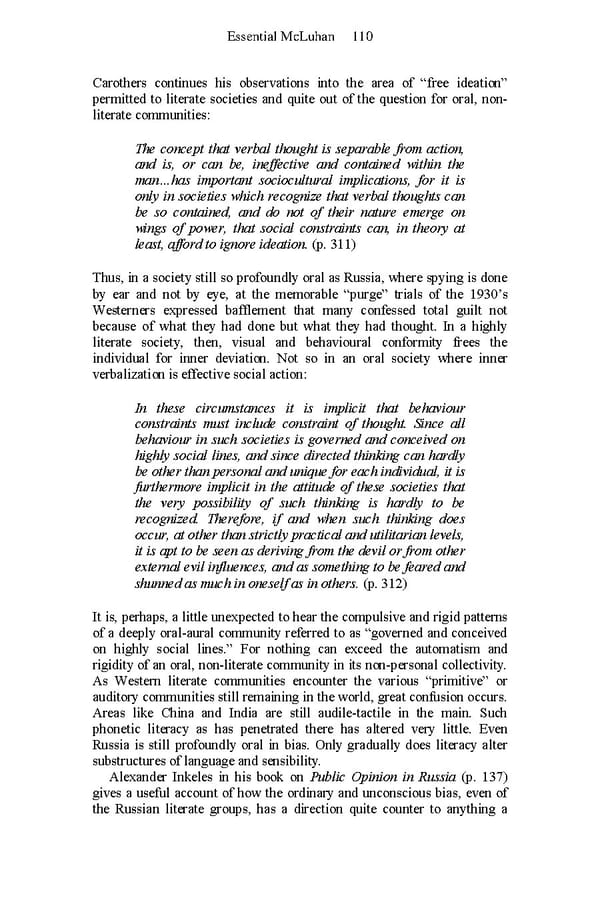Essential McLuhan 110 Carothers continues his observations into the area of “free ideation” permitted to literate societies and quite out of the question for oral, non- literate communities: The concept that verbal thought is separable from action, and is, or can be, ineffective and contained within the man…has important sociocultural implications, for it is only in societies which recognize that verbal thoughts can be so contained, and do not of their nature emerge on wings of power, that social constraints can, in theory at least, afford to ignore ideation. (p. 311) Thus, in a society still so profoundly oral as Russia, where spying is done by ear and not by eye, at the memorable “purge” trials of the 1930’s Westerners expressed bafflement that many confessed total guilt not because of what they had done but what they had thought. In a highly literate society, then, visual and behavioural conformity frees the individual for inner deviation. Not so in an oral society where inner verbalization is effective social action: In these circumstances it is implicit that behaviour constraints must include constraint of thought. Since all behaviour in such societies is governed and conceived on highly social lines, and since directed thinking can hardly be other than personal and unique for each individual, it is furthermore implicit in the attitude of these societies that the very possibility of such thinking is hardly to be recognized. Therefore, if and when such thinking does occur, at other than strictly practical and utilitarian levels, it is apt to be seen as deriving from the devil or from other external evil influences, and as something to be feared and shunned as much in oneself as in others. (p. 312) It is, perhaps, a little unexpected to hear the compulsive and rigid patterns of a deeply oral-aural community referred to as “governed and conceived on highly social lines.” For nothing can exceed the automatism and rigidity of an oral, non-literate community in its non-personal collectivity. As Western literate communities encounter the various “primitive” or auditory communities still remaining in the world, great confusion occurs. Areas like China and India are still audile-tactile in the main. Such phonetic literacy as has penetrated there has altered very little. Even Russia is still profoundly oral in bias. Only gradually does literacy alter substructures of language and sensibility. Alexander Inkeles in his book on Public Opinion in Russia (p. 137) gives a useful account of how the ordinary and unconscious bias, even of the Russian literate groups, has a direction quite counter to anything a
 Essential McLuhan Page 116 Page 118
Essential McLuhan Page 116 Page 118